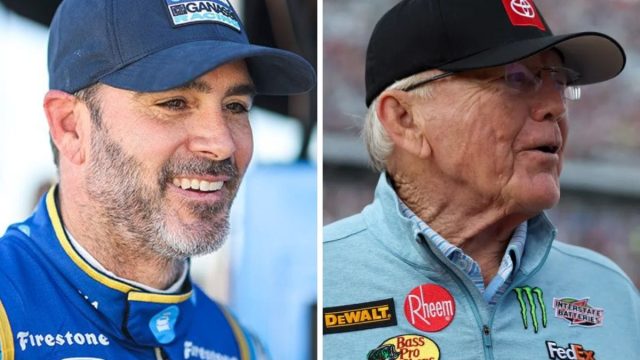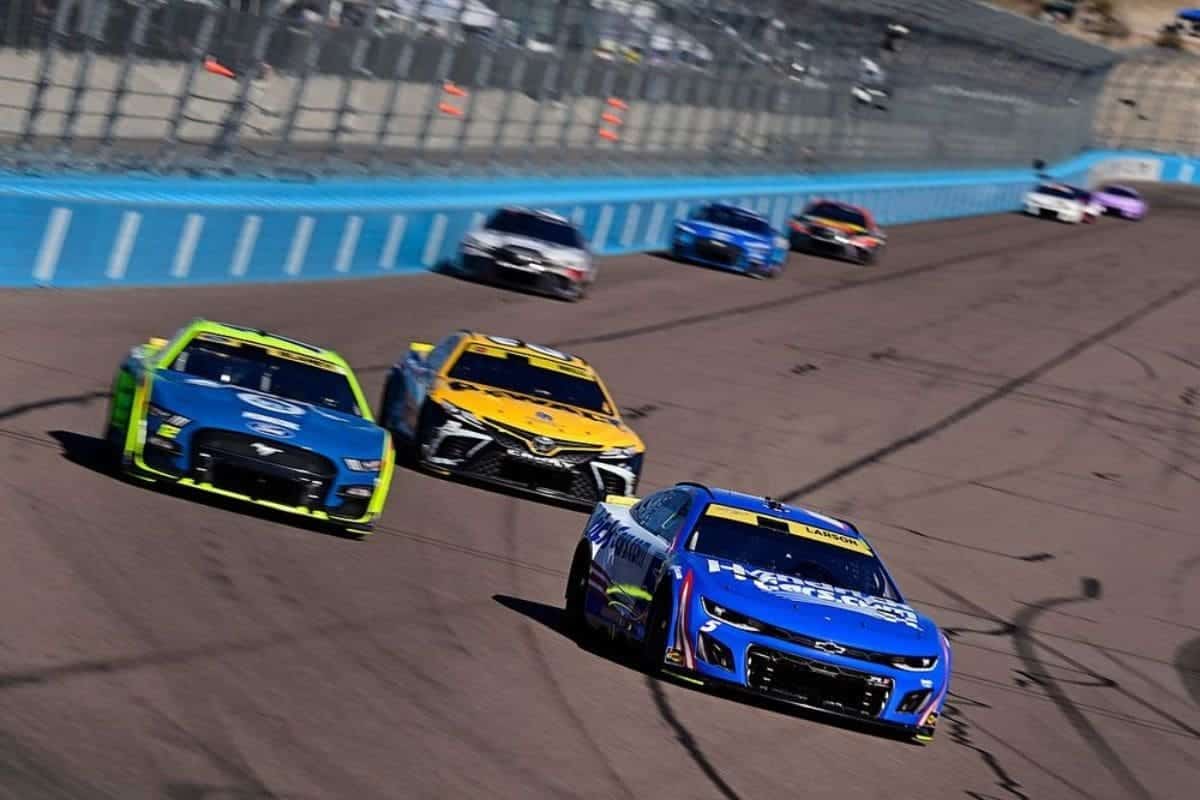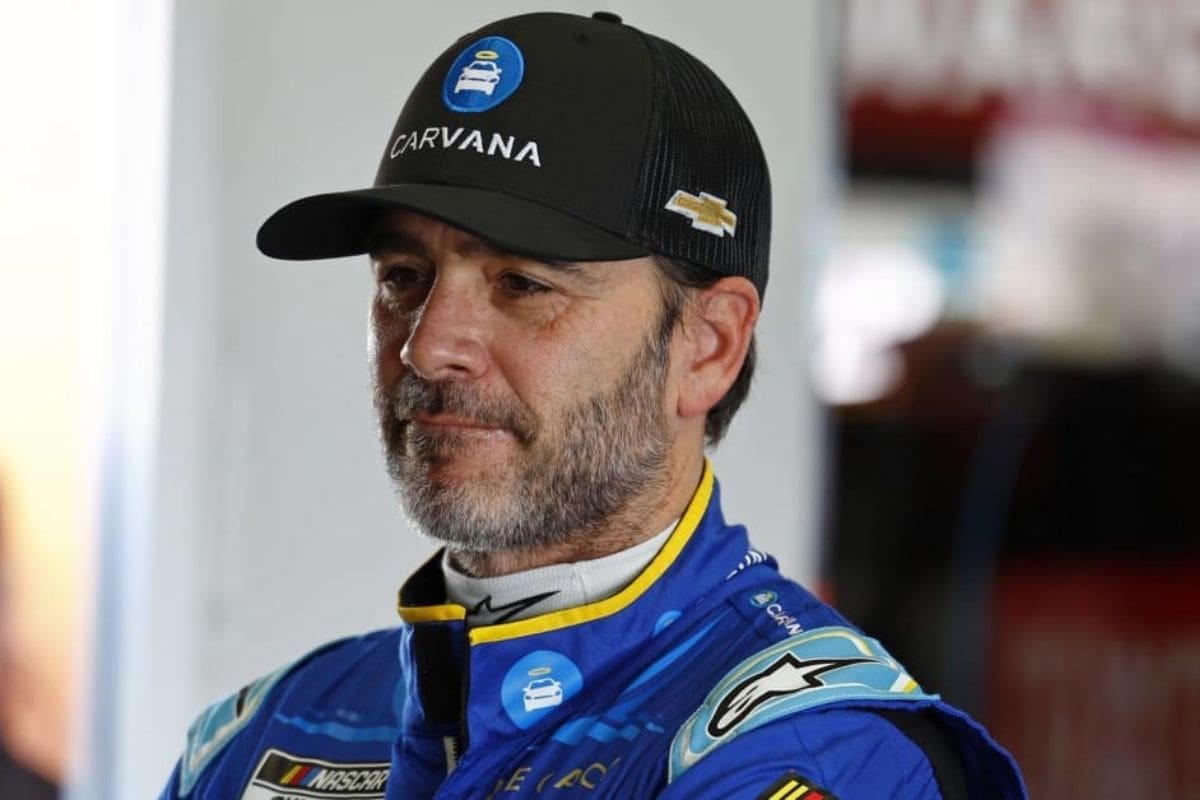Jimmie Johnson Rejected Joe Gibbs: Jimmie Johnson’s decision to turn down Joe Gibbs Racing‘s assistance for Legacy Motor Club signals a bold move towards autonomy in the NASCAR Cup Series. This choice is not without its immediate challenges; however, Johnson’s commitment to cultivating a self-reliant team reflects a strategic vision aimed at long-term dominance. By prioritizing internal innovation over external support, Johnson hopes to carve out a unique identity for Legacy Motor Club. This move raises questions about the potential impacts on performance and the broader implications for team dynamics and competitive balance in NASCAR.
Key Highlights
- Jimmie Johnson envisions Legacy Motor Club becoming a self-sufficient powerhouse by fostering internal innovation.
- Independence was chosen over a technical alliance with Joe Gibbs Racing to maintain proprietary information.
- The team faces short-term struggles in setup, aerodynamics, and race strategies due to the transition to Toyota.
- Johnson emphasizes long-term goals over immediate performance improvements.
- Fans have mixed reactions, balancing cautious optimism with realism about the challenges ahead.
Legacy Motor Club’s 2024 NASCAR Cup Series Struggles
Legacy Motor Club’s 2024 NASCAR Cup Series season has been fraught with challenges, stemming in part from their bold decision to switch from Chevrolet to the Toyota Camry XSE. This strategic shift was met with skepticism within the racing community, given the significant adaptations required to shift between manufacturers.
The Camry XSE, while a competitive vehicle, necessitated a steep learning curve for the team, impacting their performance metrics early in the season.
One of the primary hurdles has been the integration of new engineering and performance data specific to Toyota vehicles. The team had to recalibrate their approach to aerodynamics, engine tuning, and chassis dynamics, which is no small feat in the high-stakes environment of NASCAR. The lack of historical data with Toyota further compounded these challenges, leading to inconsistencies in race setups and strategy execution.
Moreover, Legacy Motor Club’s decision to operate independently, without technical alliances with established powerhouses like Joe Gibbs Racing, has deprived them of crucial resources. While independence can foster innovation and a unique competitive edge, it also limits access to shared technological advancements and collaborative problem-solving. This move has placed additional strain on the in-house engineering team to develop solutions that rival those of more resource-rich competitors.
Despite the best efforts of the team’s engineers and drivers, the initial results have been disappointing. Frequent mechanical issues and suboptimal race finishes suggest that the shift phase is still ongoing.
Impact of Independence on Performance
While the challenges of switching manufacturers have been significant, the decision to operate independently without the technical support of Joe Gibbs Racing has undeniably had a more profound impact on Legacy Motor Club’s performance this season. This move, designed to establish a unique identity and foster innovation within the team, has yielded mixed results, revealing the potential and pitfalls of racing autonomy.
The statistics starkly highlight the difficulties faced: a mere three top-10 finishes, four DNFs, and just 20 laps led across three drivers emphasize the struggle. The absence of Joe Gibbs Racing’s well-established technical expertise has left Legacy Motor Club grappling with setup issues, aerodynamic inefficiencies, and inconsistent race strategies. These challenges have not only affected race day outcomes but have also strained the team’s morale and cohesion.
However, this period of struggle should not be seen as a complete detriment but rather as a learning curve. Independence fosters a culture of self-reliance and innovation, which, although currently yielding disappointing results, could prove beneficial in the long run. The team now has the opportunity to develop proprietary technologies, build a more cohesive internal structure, and cultivate a unique competitive edge.
Moreover, the decision to reject external assistance from a powerhouse like Joe Gibbs Racing shows a bold vision for the future, emphasizing the importance of self-determination in a sport increasingly dominated by technical alliances. While the immediate performance metrics may paint a bleak picture, the long-term gains in resilience and innovation could eventually turn the tide.
Jimmie Johnson’s Long-Term Vision
Jimmie Johnson envisions Legacy Motor Club evolving into a self-sufficient powerhouse, capable of developing proprietary technologies and strategies that will secure a competitive edge in the long term. This ambitious vision requires the team to endure significant short-term hurdles, a challenge they have willingly embraced by choosing to remain one of the few stand-alone teams in the Toyota ecosystem.
Rather than forming a technical alliance with Joe Gibbs Racing, which would have guaranteed immediate competitive benefits, Johnson and co-owner Maury Gallagher have opted for the path of independence, albeit at the cost of short-term performance. This strategic decision highlights the team’s commitment to its long-term goals. For Johnson, the allure of autonomy is not just about avoiding the hefty expenses of a technical partnership; it is about fostering an internal culture of innovation and mastery.
By developing their technologies and strategies in-house, Legacy Motor Club aims to carve out a unique identity and competitive advantage that cannot be easily replicated. This approach aligns with Gallagher’s vision of a team that is not only competitive but also self-reliant and pioneering. The path towards this vision is fraught with challenges. The immediate future may see Legacy Motor Club grappling with competitive inconsistencies as they build their technological and strategic capabilities from the ground up.
However, the potential rewards—a robust, independent team with proprietary advancements—justify the initial struggles. Johnson and Gallagher’s long-term perspective is clear: achieving sustained success will come not from short-term alliances but from nurturing a foundation of self-reliance and innovation that will serve the team for years to come.
Insights from Bob Pockrass and Jimmie Johnson
Understanding the intricate dynamics at play, Bob Pockrass and Jimmie Johnson offer valuable insights into the challenges and strategic decisions shaping Legacy Motor Club’s current trajectory.
“What is going on with Legacy? Both cars struggling mightily and not showing any improvement from week to week. Is this just figuring out Toyota or something bigger?” – (question to bob pokrass)
Bob Pockrass, a seasoned observer of the motorsports landscape, showed the complexities Legacy Motor Club faces. When questioned about the team’s ongoing struggles and lack of week-to-week improvement, Pockrass attributed it to a combination of factors. According to Pockrass, Legacy Motor Club is diligently working on refining its internal processes and opted to maintain independence rather than aligning closely with Joe Gibbs Racing (JGR). This strategic choice allows Legacy to keep all its information proprietary, although at the cost of potentially slower development.
A little bit of both. Legacy still working on getting its processes right to come to the track up to speed. It decided to do it on its own rather than align with JGR so all its info is kept in-house. But they knew that could mean slower development to be fast. https://t.co/2IZKExDL2S
— Bob Pockrass (@bobpockrass) June 13, 2024
Jimmie Johnson, co-owner of Legacy Motor Club, echoes this sentiment, emphasizing the long-term vision behind their independent approach. Johnson highlighted the belief of Maury Gallagher, who insists on creating a unique entity within the racing world, bolstered by Toyota’s support. Johnson stated, “He (Maury Gallagher) really believes in this process and wants us to rise to the occasion and create our own entity with the support of Toyota, of course.” This emphasizes the commitment to building a robust foundation that promises sustainable success, even if it means enduring initial growing pains.
The approach taken by Legacy Motor Club highlights a strategic patience, aiming for durable success rather than quick fixes. This decision to abandon reliance on an established powerhouse like JGR is a manifestation of their confidence in their development capabilities and their pursuit of a distinctive competitive edge.
Fan Reactions to Legacy Motor Club’s Strategy
Fan reactions to Legacy Motor Club’s strategy reveal a mix of cautious optimism and pragmatic realism, reflecting a deep understanding of the challenges and risks involved in forging an independent path in motorsports. Many fans drew parallels to the fate of Furniture Row Racing, which aligned with Joe Gibbs Racing (JGR) for chassis and pit crew support in 2016. Despite winning the championship, the increased fees in the range of 10–12 million dollar demanded by JGR eventually led to Furniture Row Racing’s closure.
This historical context has made many fans wary of similar alliances. One fan articulated this sentiment, stating, “After watching Furniture Row and Leavine Family go out of business, following their JGR partnerships, I can’t say I blame them.” Others echoed this viewpoint, emphasizing that while Legacy Motor Club’s approach may result in slower development, it appears to be the only viable long-term strategy.
“But they knew that could mean slower development to be fast. They did not have a choice here. Really. What choice did they have? Align with JGR like Furniture Row and get screwed when you have a little success? Nope. No sane team would ever align with JGR again, aside from 23XI who is a) under Gibb’s thumb anyway because of Hamlin and b) has Jordan whose net worth makes Joe Gibbs net worth look like it’s just walkin-around money.” – (fan reaction)
Support for Jimmie Johnson’s strategic direction was also evident. One fan expressed admiration, remarking, “JJ playing the long game, love it.” Another suggested practical changes such as a crew chief swap to improve performance, reflecting a desire for immediate improvements within the team’s structure.
“Need something at happen at LMS soon crew chief swap possibly with Erik and Dave and I know Maury can’t be happy with the direction of the team he is the majority share holder he likes winning and team racing in top 15.” – (fan reaction)
Despite the strategic optimism, fans are realistic about the challenges ahead. With only three top-10 finishes between drivers Jimmie Johnson, Erik Jones, and John Nemechek, the road to competitiveness is acknowledged to be arduous. One fan queried NASCAR journalist Bob Pockrass on a timeline for achieving a competitive car, emphasizing the community’s vested interest in Legacy Motor Club’s future trajectory.
“@bobpockrass At what point is it realistic for them to “catch up”? By the end of the year? In time for next year? Or are they multiple years away from being competitive?” – (fan reaction)
News in Brief: Jimmie Johnson Rejected Joe Gibbs
Jimmie Johnson’s rejection of Joe Gibbs Racing’s assistance in favor of fostering independence for Legacy Motor Club reflects a strategic commitment to long-term innovation and self-sufficiency. This decision, despite presenting immediate challenges, aims to cultivate a unique competitive edge through internal development.
The approach highlights a vision for sustainable success, setting Legacy Motor Club apart in the competitive landscape of NASCAR. Insights from industry experts and fan reactions emphasize the potential rewards and inherent risks of this ambitious strategy.
Our Reader’s Queries
Q. What car is Jimmie Johnson driving in the Daytona 500?
A. Damage to his Toyota Camry was minimal, allowing him to secure a 12th-place finish and clinch the 23rd starting spot for the Daytona 500. But just five laps into the 200-lap Daytona 500, Johnson found himself caught in a seven-car wreck on the frontstretch of the 2.5-mile track.
Q. Who is Jimmie Johnson driving for in 2024?
ALSO READ: Jimmie Johnson’s All-Star Milestone Sparks Prize Money Debate



